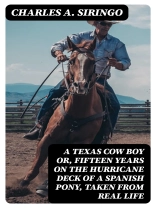In ‘A Texas Cow Boy or, Fifteen Years on the Hurricane Deck of a Spanish Pony, Taken from Real Life, ‘ Charles A. Siringo embarks on a vivid and authentic exploration of cowboy life during the late 19th century. Through a masterful blend of personal narrative and regional folklore, Siringo paints a lively portrait of the American West, detailing both the hardships and the camaraderie encountered on the open range. His engaging prose employs a conversational style that draws readers into his unique experiences, capturing the essence of frontier life while contributing to the growing canon of American cowboy literature in the post-Civil War era. Born in 1855 in Illinois, Siringo’s upbringing and early experiences as a cattle rancher and cowboy significantly impacted his writing. His adventures across Texas and the Southwest not only supplied rich material for his stories but also reflect the turbulent societal changes of the time, including issues of identity, work, and the mythos of the cowboy. His firsthand encounters with diverse cultures and characters reveal a depth of insight, making him an important chronicler of this unique chapter of American history. Readers seeking an authentic representation of cowboy life will find Siringo’s narrative both exhilarating and enlightening. This work serves not only as a thrilling adventure but also as a historical document capturing the intricacies of a lifestyle that has shaped American culture. Whether one is a fan of Western literature or simply curious about the era, Siringo’s engaging account offers a vital perspective that is both entertaining and educational.
A propos de l’auteur
Charles Angelo Siringo (1855–1928) was an American cowboy, detective, and agent for the Pinkerton National Detective Agency during the latter part of the 19th century. His colorful and adventurous life was immortalized in his autobiographical account, ‘A Texas Cow Boy or, fifteen years on the hurricane deck of a Spanish pony, taken from real life’ (1885), which stands out as a classic in the genre of Western autobiographies. Siringo’s narrative style blends the factual with the anecdotal, presenting a vivid portrayal of the cowboy life on the open range, replete with tales of cattle drives, horse trading, and encounters with Native American tribes. His book not only provides an authentic glimpse into the Old West but also contributes to the American cowboy mythos and folklore. Siringo’s literary style has been celebrated for its directness and lack of pretension, capturing the vernacular of the time and bringing the experiences of the cattle trails to life. Unique to his work is the perspective of someone who lived through the era of the Wild West, thus offering historians and enthusiasts alike valuable insights into this iconic period of American history. Despite his renown as an author, Siringo’s later career as a Pinkerton detective, during which he infiltrated outlaw bands and labor unions, cast a somewhat controversial shadow over his legacy. Nonetheless, his literary achievement in ‘A Texas Cow Boy’ remains an indispensable contribution to the cultural and historical record of the American frontier.












